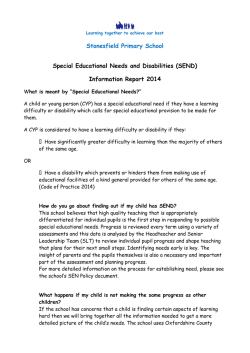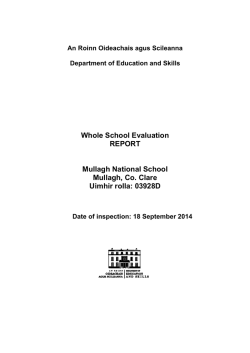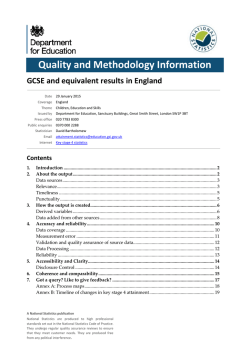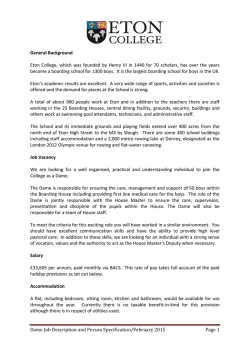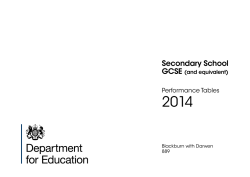
Manorhigh SEND Local Offer
Information for Parents and Carers of children with Special Educational Needs and Disabilities (SEND) 1. The kinds of special educational need for which provision is made at Manor High School Overview Manor High School provides a broad and balanced curriculum for all our pupils including those with Special Educational Needs and Disabilities and ensures full curriculum entitlement and access. We are committed to maximum integration commensurate with meeting individual needs, the highest quality of education for all pupils and the efficient use of resources. Manor High School is a mainstream setting catering for children aged from 10 to 14 years with about 900 pupils on roll. Manor High School strives to be an inclusive school and has an ‘Inclusion Policy’ which focuses on inclusive practice and removing barriers to learning. It acknowledges the range of issues to be taken into account in the process of development. All pupils are welcome, including those with Special Educational Needs and Disabilities, in accordance with the LA’s admissions policy. Manor High strives to be an inclusive school engendering a sense of community and belonging through its: Inclusive ethos Broad and balanced curriculum for all pupils Systems for early identification of barriers to learning and participation High expectations and suitable targets for all children In accordance with the Equality Act 2010 the school is accessible for students including lifts and wheelchair access; we also support pupils at school with medical conditions including the administration of some medication. 2. Info about Manor High’s policy for the identification and assessment of pupils with special educational needs How does Manor High School identify children with Special Educational Needs and Disabilities? The SENCo is the professional leader in the area of Special Educational Needs and Disabilities and as such is responsible for: the day to day operation of the school’s Special Educational Needs Policy. assisting staff in the identification and assessment of pupils with SEND. advising on classroom and other appropriate strategies. liaising with parents, support staff and other external agencies. maintaining the school’s SEND files and record. informing and advising the governors. continuing their professional development in SEND. contributing to staff training. managing the budget for SEND in conjunction with the Head teacher. Pupils with Special Educational Needs or Disabilities are identified as early as possible. Manor has established a two staged process for identification, assessment and provision, in accordance with the 2014 Code of Practice. These stages are: SEND Support Statement/Education Health and Care Plan (EHCP). The first stage is a school based stage where it is anticipated the needs of pupils can be met through school based provision. Where pupils at this level are showing increased levels of need and involvement from external agencies an SEND Support Plan will be put into place to access resources over and above what the school is able to provide. These SEND Support Plans will be reviewed in line with the schools systems of assessing, planning and reviewing progress. This graduated response recognises that there is a continuum of Special Educational Needs and Disabilities, and that the majority of children will lie at the SEND Support Stage. Manor High’s arrangements for implementing levels of action are guided by the LA’s document ‘Criteria for Placement’. Prior to placing a child on the Special Educational Needs and Disabilities Support Record, class teachers or tutors may identify pupils with a potential Special Educational Need and consulting the Special Educational Needs Coordinator, an initial action to address those needs and concerns is taken and progress monitored. The triggers for intervention through SEND Support could be the teacher’s or other’s concern if the child: makes little or no progress even when teaching approaches are targeted particularly in a child’s identified area of weakness. shows signs of difficulty in developing literacy or numeracy skills that result in poor attainment in some curriculum areas. presents persistent social, emotional or mental health difficulties, which are not ameliorated by the behaviour management policy employed by the school. has sensory or physical problems, and continues to make little or no progress despite the provision of specialist equipment where appropriate. Has communication and/or interaction difficulties, and continues to make little or no progress despite the provision of differentiated lessons or an adapted curriculum. The indicators for a pupil receiving SEND Support to have a SEND Support Plan may be: continues to make little or no progress in specific areas over a long period. continues working at National Curriculum levels substantially below that expected of children of a similar age. continues to have difficulty in developing English and Maths skills. have social, emotional and or mental health difficulties which substantially and regularly interfere with the child’s own learning or that of a class group, despite having structured support, often in the form of well-planned differentiated lessons. has sensory or physical needs, and requires additional specialist equipment or advice or visits by a specialist service. has ongoing communication or interaction difficulties that impede the development of social relationships and cause substantial barriers to learning. The class teachers, working with other relevant staff (for example LSA’s) will gather relevant evidence and meet with the SENCO and a decision will be made whether or not to place a child on the SEND Support Record. The tutor or SENCO will arrange to meet the pupil’s parents/carers to discuss the areas of concern; strengths; home support; targets and review timescale. At the review parents/carers contributions will be recorded. The school representative will make the pupil aware of his/her targets. The pupil’s views will be recorded. The pupil will not necessarily have personal targets as the pupil’s needs will be met through class layered target setting and SEND Support intervention targets. A pupil with an SEND Support Plan could have had the involvement of external support services, both those provided by the LA and by outside agencies. These will be consulted to provide more specialist assessments and to advise teachers about strategies including more personalised targets to address individual needs where required. Parents are always consulted before an external agency is involved. If a pupil, despite the school having taken relevant and purposeful actions to identify, assess and meet the SEND of the child or young person, has not made expected progress, the school will consider requesting additional support funding or an Education, Health and Care needs assessment. The school will provide evidence of the action it has taken in the form of an SEND Support Plan to inform the Local Authorities decision. The LA considers the need for an EHCP and they will arrange, monitor and review provision. 3. Information about Manor High’s policies for making provision for pupils with special educational needs whether or not pupils have Education Health and Care (EHC) Plans including: a) How it evaluates provision How does Manor High School know how effective its provision for children with Special Educational Needs is? Manor High has a Special Educational Needs and Disabilities monitoring and evaluation plan. Each year the SENCo will focus on certain areas of provision to Monitor and Evaluate and the outcomes are shared with all stakeholders and help to formulate the contents of the SEND Development Plan where improvements need to be made and staff training need to be planned. These areas include: Policy pupil progress the quality of target setting quality of teaching and support staff and pupil attitudes parent attitudes human and material resources staff professional development accommodation and environment. The SENCo also updates annually a report which provides a detailed analysis of the progress of SEND Learners in relation to other vulnerable groups and provides an overview of how well the school is performing in relation to the national picture. The policy for making provision will be drawn up in consultation with various stake holders. It will be monitored through discussion with the governor responsible for Special Educational Needs and Disabilities. b) Arrangements for assessing and reviewing the progress of pupils with special educational needs. How will I know how my child is doing and how will you help me support my child’s learning? All children on the SEND Support Record have a half termly progress report, this is sent home. The student will have a review meeting with their tutor and possible further meetings with the SENCO if they are not progressing at rate we would expect. Targets will be set with the student to help them to understand, and focus on, their needs. Staff are made aware of the strategies to help the student and should incorporate them in their planning. This process also applies to pupils with a statement/EHCP (Education Health and Care Plan). In addition there is an Annual Review meeting held to review the plan involving all stakeholders. The SENCo tracks the progress of all the pupils on the SEND Record or the Record of Concern each term through: Analysing data and teacher assessments Intervention programme monitoring sheets Pupil target reviews Small steps trackers External agency reports. This information helps to track the progress of individual pupils, whether they are making progress against their targets and whether or not the level of support they are receiving is appropriate to their needs. The SENCo will then compile an audit of pupil needs and a provision map is constructed. The provision map outlines the level of support required and how long for. It outlines which pupils will be engaged in which intervention programmes. All support staff are trained to deliver the intervention programmes appropriate to the groups of pupils they are supporting. These interventions are then timetabled to operate at a time that is least disruptive to their classroom learning, often during tutor time. The SENCO carries out pre and post intervention assessments on all the pupils on the SEND Record to ensure the interventions have had an impact on pupil progress and to ensure that the progress is at least good. c) Manor High’s approach to teaching pupils with SEND How will my child be supported? All pupils are taught in classes arranged by age. Teachers provide learning opportunities for all children within this environment and provide resources appropriate to pupils’ interests and abilities. The structures and systems in place are: Classroom support to increase curriculum access and pupil achievement. Differentiated provision within mixed classes and classes which are set. Intervention programmes guided by a pupil needs and the availability of extra staffing (if required) Well differentiated curriculum planning which incorporates a variety of learning styles to deliver Quality First Teaching. Clear guidelines on behaviour with a structured reward and sanction system. There is a Professional Development Plan to ensure all staff engaged with pupils with learning needs have the training and skills to support pupils in their class. An audit of support staff skills is carried out each year to make sure that skills are matched to the pupils’ area of need when mapping provision for individuals or groups of pupils. LSA’s are often subject specialists as this gives the best all round support for students. The school outlines its provision in three stages; Universal provision (provision available to all pupils in school) Targeted Support (provision made for pupils who made need some additional support or intervention to attain at age appropriate levels) SEND Support (provision for pupil on the SEND Record). Pupils receiving SEND Support with a higher level of need may have an SEN Support Plan. This Plan will include contributions by the parent and pupil about their needs, contributions from external agencies such as social care or health agencies or Educational Psychologists. This plan is used as working document to support the child’s needs in school and is reviewed at a regular basis. Staff provide the SENCo with information which detail when interventions, support programmes and in class support is happening. Pupils with a Statement or EHCP have individual timetables which outline the provision they receive. d) Adapting the curriculum and learning environment How will the curriculum be matched to my child’s needs? The aims of Manor High School are based on the values derived from the Statement of Principles adopted by the LA and guided by the DfE Code of Practice for SEND. The school provides a broad and balanced curriculum for all our pupils including those with Special Educational Needs and Disabilities and ensures full curriculum entitlement and access. We are committed to maximum integration commensurate with meeting individual needs, the highest quality of education for all pupils and the efficient use of resources. All class teachers are aware of their responsibilities to all pupils including those with SEND in their class. There are regular sessions of staff training which focus on a range of areas of need to develop staff understanding and provide them with skills, strategies and resources, human and material, to meet the needs of pupils in their class. All planning demonstrates differentiation to meet the learning needs of all pupils. A range of learning styles are also identified and recorded in planning. It is expected that within the classroom equal access to learning support from the class teacher is provided for all groups of learners and that not all learning support will provided by the Learning Support Assistants. Class teachers’ planning includes where adult and teacher support will be deployed during the lesson. Teachers support all groups of pupils including those with SEND during a sequence of lessons. Teachers plan to encourage pupil participation at all stages of the lesson using a variety of teaching methods and strategies including time to think and discuss with ‘work partners’ so learners are able to support each other. Pupils have opportunities to work as part of a class, in small groups, in pairs and individually. These grouping may be ability grouped or mixed ability encouraging pupils to support each other e) How Manor High will provide addition support for learning How is the amount and type of support my child will receive decided? At Manor High, pupils on the SEND Support Record will have additional support which is determined by their needs. Pupils with a statement will get the hours of 1 to 1 support by an LSA in the classroom. Others may get targeted support in lessons or 1 to 1 during tutor time to help raise their achievement. By monitoring pupil progress through the systems outlined in section 3a) the area of need and appropriate level of support will be identified. This may include: Small group support work in class for some subjects. Small group intervention work for reading, phonics, spelling, writing or maths programmes. Individual support for reading, speech and language programmes, occupational therapy programmes. Social skills groups Physical development programmes to support fine and gross motor skills Nurture support, 1:1 support for Social Emotional and Mental Health Needs. Every class that has a Learning Support Assistant (LSA) requires the class teacher to liaise with their LSA to plan support programmes appropriately. Classes where there are higher levels of need will receive more Learning Support Staff support than those that have less. The level and frequency of support will depend on the individual level of need. f) Activities that are available for pupils with special educational needs in addition to those available in accordance with the curriculum. How will my child be included in activities outside the classroom? Pupils with SEND are given roles and responsibilities to encourage them to be confident and develop self-esteem. Pupils are represented proportionately in after school activities and on the School Council. The School has a very inclusive ethos and there is an Inclusion Policy and Development Plan in place to ensure that this remains at the forefront of our future planning. Pupils with a range of needs are represented well as a proportion of pupils in the school at a variety of clubs. The school offers a wide range of extra- curricular activities and clubs. Where there is a financial implication pupils in receipt of pupil premium will be subsidised by the school to enable them to attend. Risk assessments are completed by staff prior to any educational visits and where appropriate additional staff are deployed to support the students so everyone has the same opportunity. The school provides two games rooms (one quiet and one noisier) at break and lunch. The rooms are supervised by LSA’s and provide a safe place for students to improve their interpersonal skills as well as having the opportunity to get help with work. Learning Support Staff also provide 1:1 support for pupils with a high level of need at playtime/lunch times and the school’s new vertical tutoring system has allowed for ‘buddy’s’ to support where needed. The mobile is always a place for students to go for support. There are Heads of House as well as social and emotional support provided by staff. g) Support that is available for improving the emotional and social development of pupils with special educational needs How will you support my child’s social and emotional needs? Manor High School has developed a policy for ‘Supporting Pupils at School with Medical Conditions’ including the administration of medication. In consultation with parents an agreement about the administration of medications is drawn up and staff with permission will administer medicines at certain points in the day. These are stored in a locked cupboard or a fridge in the medical room. There is a pastoral slot at every staff meeting where concerns over any pupil can be shared with staff to heighten awareness and develop a whole school approach to meet needs. These are followed up by emails to all appropriate staff to act as a reference. The school has a clear behaviour policy which is followed across the school for consistency. The pupils are aware of the reward systems in school but also of the sanctions. Pupil attitude surveys outcomes are that pupils are positive about their learning and enjoy coming to school. Where there are pupils with very specific difficulties in relation to Social, Emotional and Mental Health Needs, staff training is given to heighten staff awareness and develop strategies to meet those needs as whole school approach. Mrs Dhinsa and Miss Clitsome are none teaching staff who are employed by the school to support the students. We also have a school councillor who arranges meetings with students to discuss their needs and worries. The SMILE team are a group of students who have trained to be councillors. The SMILE office is open every lunch time for students who need support but feel unable to talk to an adult. The team have a great record in solving disputes and encouraging students to meet with the appropriate adult to help meet their needs. Manor liaises with external agencies such as Autism Outreach and the Psychology services to access training to support individual needs. The school car park is securely gated and monitored by security cameras. Visitors to the school need to request access at reception. All visitors are required to sign in and are provided a visitors badge via our electronic check in system. At Manor High School we encourage pupils to contribute individually to determining the direction of their learning by recognising their own strengths and weaknesses and where appropriate to take an active part in setting and monitoring their own targets. Pupils with SEND are given roles and responsibilities to encourage them to be confident and develop self-esteem. 4. The name and contact details of SEN co-ordinator of SEND How will I be able to raise any concerns I have? Please ring the school for an appointment or e mail the school office. The Special Educational Needs Coordinator at Manor High School is Mr Steve Howey. [email protected] Tel: 0116 272 0277 5. Information about the expertise and training of staff in relation to children and young people with special educational needs and how expertise is secured. What training and expertise do staff supporting children with SEND Have? SEND issues are regularly discussed at staff meetings. All staff are made aware of their responsibilities towards pupils with SEND and clear communication lines between teachers, support staff and specialist staff are established. A programme of staff development, to be included in the school development plan, is implemented for both SEND support staff and class teachers. All staff, including support staff, have attended training using the Inclusion Development Plan materials on Specific Learning Difficulties, Autism and Social, Emotional and Mental Health. Information is available to all staff via the SEN folder in the staff resources section of the school intranet. Training is given to all new staff, including PGCE students who teach at the school. All staff have the resources and knowledge to be able to use adjust their classroom practice using strategies, ideas and resources to support all learners, including those with SEND as part of Quality First Teaching. Staff working with pupils with highly individualised needs have had specific training from external agencies in Autism, and Social and Communication skills, occupational therapy programmes, Speech and language skills and Moderate Hearing Impairment. Due to the number of staff involved, it is often the LSA who has the greater knowledge and so can support the student more effectively. The SENCo attends an annual SEND conference which looks at supporting pupils with complex learning needs. This year the conference will focus on ‘Language, Communication & Literacy’ with information about the Local Offer, EHC plans and pupil passports to share. Health referrals are made to the Leicestershire NHS Partnership Trust via the FYPC where a Care navigator will follow up on a referral and direct to the appropriate service. Similarly, contact is made with the Social Services Department and Educational Welfare Service as appropriate. Referrals are made to organisations such as ‘Early Help’ when deemed appropriate. We also work with the following services: Educational Psychology, Speech and Language Therapy, Visually Impaired and Hearing Impaired teams, Physiotherapy, Occupational Therapy, and the Autism Outreach Team. 6. Equipment and facilities to support children and young people with special educational needs. How accessible is Manor High School? Parts of the school are built on two levels, but there is access to all facilities with the use of lifts, however some access requires a longer journey around the building to avoid some small steps. Our wheelchair users in the last few years have had no problems getting to all of their lessons. The school can offer wheelchair access and disabled parking via the rear entrance directly into the reception area. There are two disabled toilets one in the main building and one in the Viking building. In accordance with the Equality Act 2010 the school has an ‘Accessibility Plan’ which shows how the school plans to improve access progressively over time and a policy for ‘Supporting Pupils at School with Medical Conditions’ including the administration of medication. Where equipment and facilities that are additional to or different from those already provided, the SENCo would contact the relevant health agencies e.g. Occupational therapist to ensure the appropriate equipment to support the pupils learning in school is available. 7. Arrangements for consulting parents How are parents involved in the school? It is the policy at Manor High to actively seek to work with parents and value the contribution they make through their unique strengths, knowledge and experience. Parents are invited and pupils are involved, where appropriate, in all relevant discussions and Personal Target setting. Parents will be given half termly progress reviews so they can see and discuss with the student areas of praise and areas where more support may be needed. Parents will always be informed of any action taken by the school and are encouraged to take part in their child’s learning. Permission will be requested from parents before the school requests any involvement from external agencies. Manor High has an open door policy and encourages parents to approach staff whenever they have a concern so a suitable time can be arranged to meet. Annual parent evenings allow parents to discuss with subject teachers how their child is performing in different curriculum areas in relation to Age Related Expectations. Each child is issued with a planner for the year. This is to help with their organisation but also is a means of communication between the school and home. The planner is signed and reviewed every week by home and by the tutor. This enables praise and problems to be addressed quickly. The tutor plays an important role at Manor High and should be the first point of contact as they know the child best. They may then forward questions to the appropriate member of staff. It is important that we keep these lines of communication open. 8. Arrangemnets for consulting/involving pupils How will my child’s views be listened to? Pupils at Manor High are engaged well in their learning and have a positive attitude towards school. We have an active student council and carry out numerous pupil voice surveys throughout the year. In general these show that pupils enjoy coming to school, this is backed up by our attendance figures which are normally in the high 90’s as a percentage. Pupils knew their target levels and ideas on how to improve. The purple pens of reflection have helped in this aspect. They find classes interesting and feel confident about joining in with class discussion. All children should be involved in making decisions where possible right from the start of their education. The ways in which children are encouraged to participate should reflect the child’s evolving maturity. Participation in education is a process that will necessitate all children being given the opportunity to make choices and understand that their views matter. At Manor High School we encourage pupils to contribute individually to determining the direction of their learning by recognising their own strengths and weaknesses and where appropriate to take an active part in setting and monitoring their own targets. The behaviour of pupils is good because they feel valued and able to make a good contribution to school life (See OFSTED REPORT June 2014.) 9. Treatment of complaints What should I do if I am unhappy? Parents are encouraged to discuss any problems or concerns with the school. These should be raised initially with the pupil’s tutor or SENCo. Most problems can be resolved in this way, but if this does not happen, parents may raise the concern with the SENCO or Head Teacher who will either contact you by telephone or arrange a meeting. 10. How the governing body involves other bodies. Who else has a role in my child’s education? The governors will seek advice and support regarding SEND issues whenever appropriate to ensure the safety and smooth educational running of the school for all pupils, staff and parents. External agencies such as health and social services bodies, local authority support services and voluntary organisations with be approached, in meeting the needs of pupils with special educational needs and in supporting the families of such pupils. Contact with such agencies will be made via our internal controls and by the using sendirect.org.uk as appropriate. (See further details below) 11. Contact details of Support services What other services are there, that might help me with information and advice? The SENCo, Mr Steve Howey [email protected] Tel: 0116 272 0277 is able to support parents in accessing or providing contact details for other support services. Manor High School already works closely with a range of external services: Speech and Language Therapy Service Educational Psychology service The Hearing Impaired Service The Autism Outreach team The Outreach Support team Social Care Leicestershire NHS Partnership Trust via the FYPC The Visual impaired team Occupational Therapy service Physiotherapy Service Family Learning There are available to parents other support networks such as Dyslexia Action and Parent Partnership. There will also be information about services which parents can access to support their child on the SENDirect website www.SENDirect.com. This website advertises service providers to support parents/carers and educational settings of c support my child when joining or transferring to a new school children with Special Educational Needs. 12. Arrangements to support transfer between phases. How will Manor High support my child when joining or transferring from or to a new school? A common system of record keeping and communication is established with our feeder school and Manor High School and between us and Beauchamp College, to ensure that pupils with SEND are known to us at transfer and known to schools to which they will later transfer. The Oadby family of Schools shares it’s systems and structures, training and good practice. The Oadby Learning Partnership has a website where resources and information are shared. There is a common approach to record keeping systems for pupils with SEND. These records are passed to Beauchamp (or other named schools) on transfer. The SENCO from Manor is invited to the Annual Review of a child with a Statement/EHCP by the SENCo from the feeder school, in the Autumn Term, which precedes transfer (Year5). For students transferring to Manor from our feeder schools, The SENCo from the school, the Year 5 students and the parents/careers, all meet the Manor SENCo at the school to get a good picture of the needs of the students. Pupils with SEND make additional visits to Manor High to help them prepare for their transition so they know where they can go to ask for help and meet staff who will be supporting them. During standard transition days, the tutors are given all the relevant information to help support the student. This is also circulated to all staff before the summer term so lessons can be planned with the support in place. All new starters are assessed on entry to Manor and this gives a baseline for us to monitor progress. The SENCO from Beauchamp (or other named school) is invited to the Annual Review of a child with a Statement/EHCP, in the Autumn Term, which precedes transfer (Year9). In the term before transfer the Beauchamp SENCO meets with our lead LSA, Year 9 children with SEND and Manor SENCO to discuss and prepare for transition. Pupils with SEND make additional visits to their new setting to help them prepare for their transition so they know where they can go to ask for help and meet staff who will be supporting them. The SENCO’s from the Oadby Development Group (Family of Schools) meet termly to monitor and discuss any issues or national initiatives about SEND. 13. Information on school/college contribution to the publication of the local authority’s local offer. Where can I find the Local Authorities Local Offer? Manor High has published our SEND information upon the schools website and details can be found within our SEND section under “local offer,” We aim to help children, young people, and parents/carers to find information and support as smoothly as possible. Encouraging and welcoming support and advice from external, internal and parental knowledge. This information will therefore be accessible to children, young people and their parents/carers directly from our school website at: www.manorhigh.leics.sch.uk Our school intends to link closely and align itself to the local authority local offer and information about the Leicestershire’s local offer regarding SEND can be found at www.leics.gov.uk. The aims of Manor High School are based on the values derived from the Statement of Principles adopted by the LA and guided by the DfE Code of Practice for SEND.
© Copyright 2026

